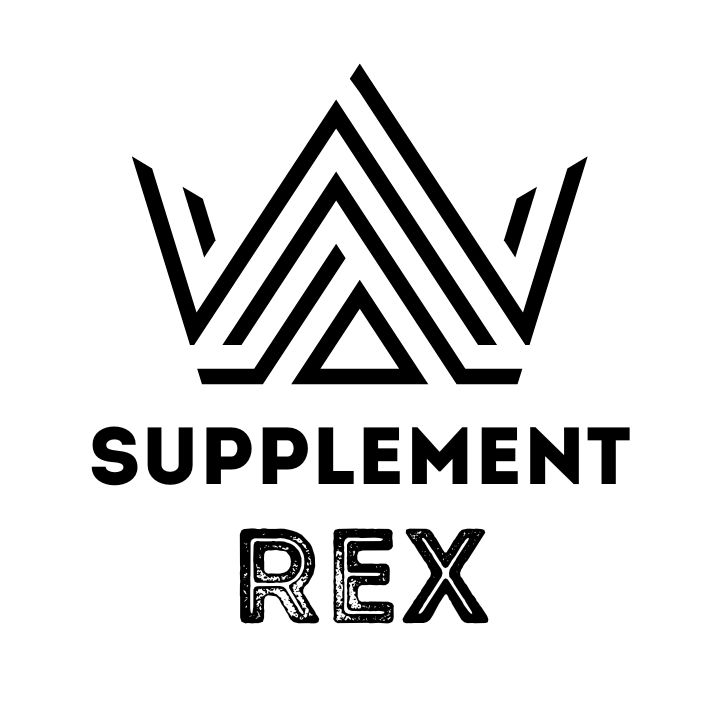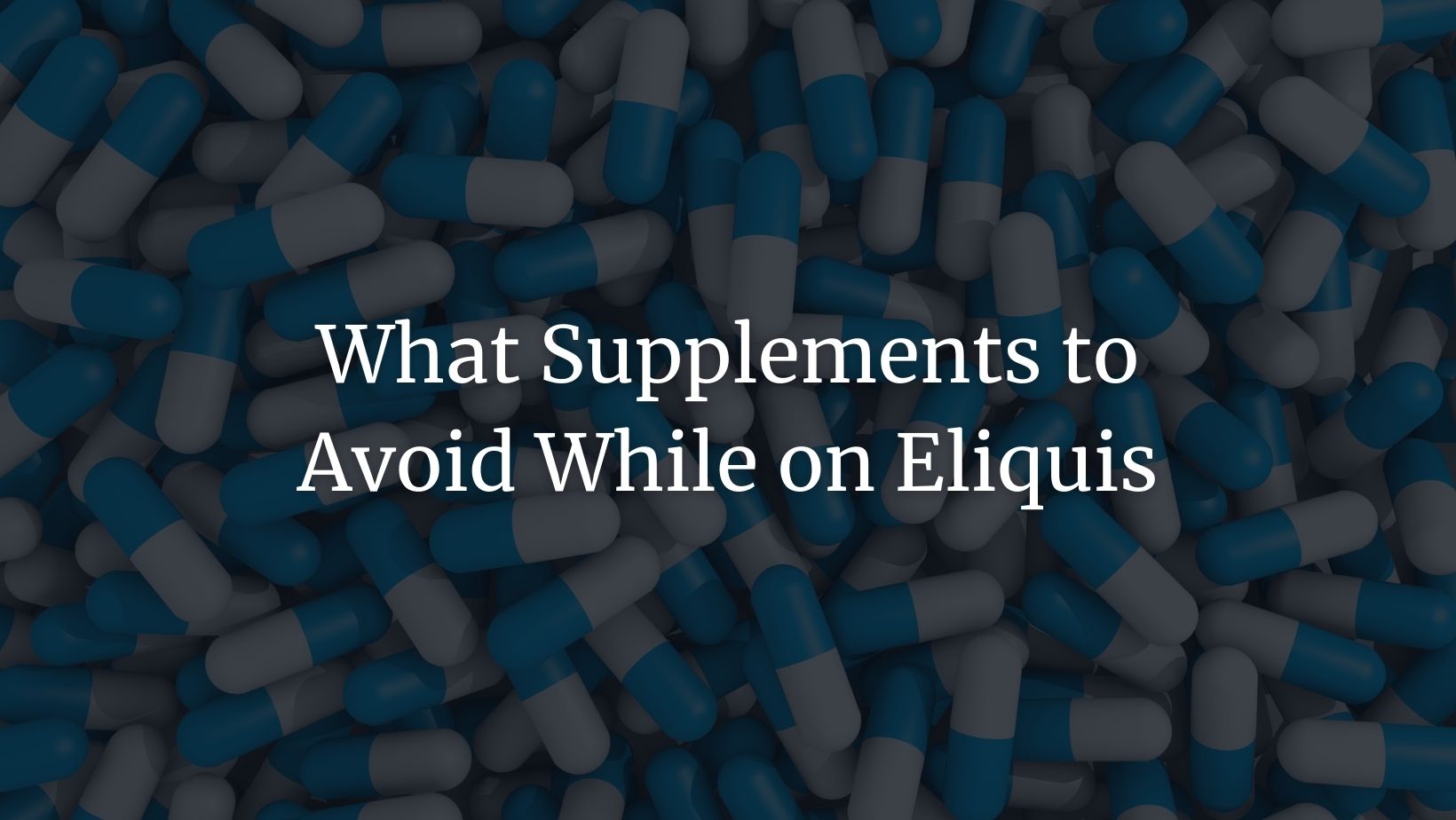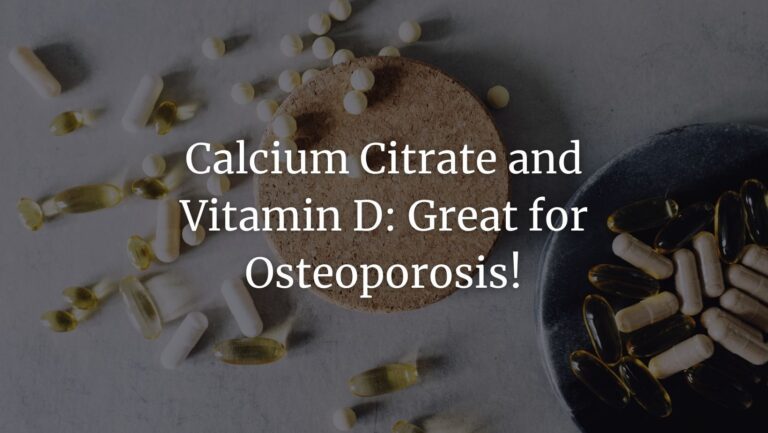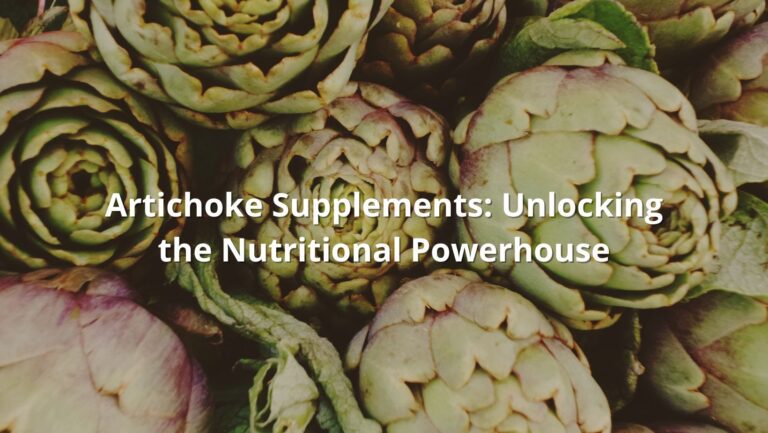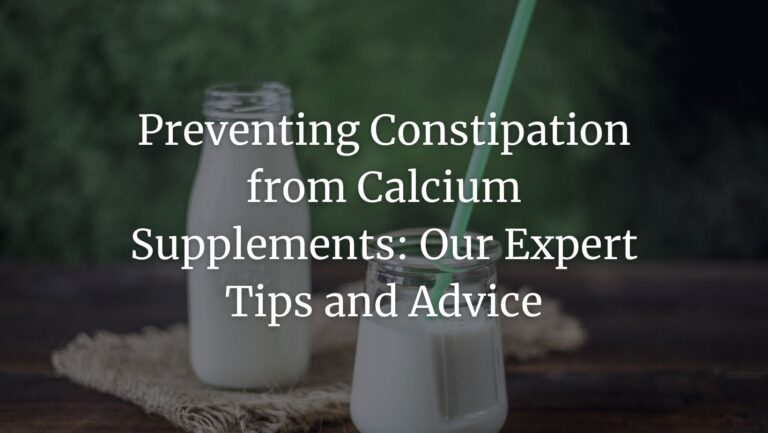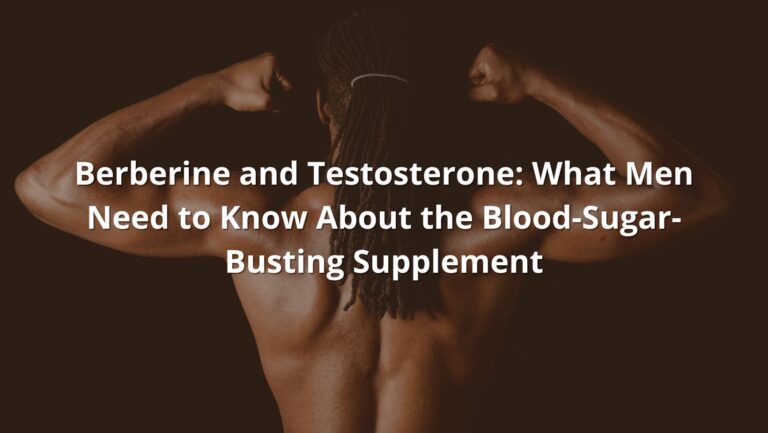What Supplements to Avoid While on Eliquis
Eliquis (apixaban) is a widely prescribed anticoagulant that has significantly improved the lives those at risk for blood clots and related complications. One of the key advantages of Eliquis is that it does not require routine monitoring like other anticoagulant medications. However, this benefit may also lead to an unintended consequence: a lack of knowledge regarding potential interactions between Eliquis and over-the-counter (OTC) products or dietary supplements.
A recent study looked at outpatient medical practices in California revealed a concerning statistic: 1 in 3 patients taking Eliquis also reported using OTC products or dietary supplements that may have potentially serious interactions with their medication
Are you taking Eliquis? Don’t put yourself at risk.
Just because apixaban is among the safer anticoagulants doesn’t mean it can’t have dangerous interactions. Taking it with the wrong supplement can increase your bleeding risk or lead to other complications, making it crucial for you to be aware of what to avoid while on Eliquis.
I understand that navigating the world of supplements and OTC drugs can be confusing, and I want to ensure that you have the knowledge necessary to make informed choices about your health. This article aims to provide essential information on which supplements and OTC drugs to avoid while taking Eliquis, and to raise awareness about the potential risks of combining these substances with your anticoagulant medication.
In the following sections, we will discuss specific supplements and OTC drugs that may interact with Eliquis, and offer guidance on how to minimize your risk of potentially harmful interactions.
Together, we can work towards improving your health and maintaining a safe, effective course of treatment while you are on Eliquis. Your vigilance and informed decision-making are essential in ensuring the best possible outcomes for your health.
Understanding Eliquis: Its Mechanism, Purpose, and Potential Risks


Eliquis, also known by its generic name apixaban, is a direct-acting oral anticoagulant (DOAC) that helps prevent blood clots from forming in your body. Blood clots can lead to serious medical conditions such as deep vein thrombosis (DVT), pulmonary embolism (PE), and stroke. By preventing the formation of blood clots, Eliquis can significantly reduce your risk of experiencing these potentially life-threatening complications.
Eliquis works by inhibiting an enzyme called Factor Xa, which plays a crucial role in the blood clotting process. By blocking the activity of Factor Xa, Eliquis effectively slows down the formation of blood clots in your blood vessels. This is important for individuals who are at increased risk of developing blood clots due to various factors, such as having a history of DVT or PE, atrial fibrillation (an irregular heartbeat), or undergoing certain surgical procedures.
Your doctor may prescribe Eliquis for various reasons, including:
- To reduce the risk of stroke and systemic embolism if you’ve been diagnosed with nonvalvular atrial fibrillation.
- For the treatment of DVT and PE, and to reduce the risk of recurrent DVT and PE after initial therapy. So, if you have experienced a deep vein thrombosis or pulmonary embolism incident, Eliquis is one of the drugs you might get to prevent these issues in the future.
While taking Eliquis, it is important to be aware of potential interactions with other medications, supplements, or over-the-counter products. Combining Eliquis with certain substances can lead to increased bleeding risks or other complications. In the following sections, we will explore these potential interactions and provide recommendations on how to avoid them.
By understanding the mechanism, purpose, and importance of following your doctor’s instructions regarding Eliquis, you are taking a significant step towards ensuring your safety and improving your health outcomes.
What Supplements to Avoid While on Eliquis


While taking Eliquis, it is important to be cautious about using certain supplements that may interact with the medication, potentially increasing your risk of bleeding or reducing the drug’s effectiveness. In this section, we will discuss some commonly used supplements that should be avoided while you are on Eliquis.
Some of these are excellent health-supporting compounds otherwise – but, they are not the right choice if you’re taking a blood thinner. I will also recommend supplement alternatives that don’t interact with Eliquis but have similar effects. Still, let your doctor know about any supplements you might be taking – whether mentioned in this article or not – so they can help you optimize your Eliquis intake.
St. John’s wort
St. John’s wort (Hypericum perforatum) is an herbal supplement often used to treat mild to moderate depression, anxiety, and sleep disorders. Despite its potential benefits, St. John’s wort can interact with a variety of medications, including Eliquis. The supplement may reduce the effectiveness of Eliquis, increasing your risk of blood clots. To ensure the optimal functioning of your medication, avoid using St. John’s wort while you are on the blood-thinning medication.
Instead of St. John’s wort, consider taking 5-HTP (a serotonin precursor) for mental health benefits – especially for depression and anxiety. If you’re having trouble falling asleep, melatonin can help and it won’t interact with your blood-thinning drug, either.
Chinese Herbs (Danshen, Dong Quai, and Ginseng)
There is a large variety of herbal preparations that traditional Chinese healers prescribe. And, while these complementary therapies can help support your wellness, they can also interact with your anticoagulant – making them a poor combination with Eliquis.
Danshen (Salvia miltiorrhiza) is a popular Chinese herb used for improving blood circulation and treating cardiovascular conditions. As it can have an impact on blood circulation, it’s best to avoid it while on Eliquis. Similarly, dong quai (Angelica sinensis) which is often taken for menstrual problems and menopausal symptoms, can also affect clotting. Finally, ginseng (Panax ginseng) is believed to boost energy, enhance mental function, and improve overall health. However, these herbs can act as natural blood thinners, which may increase your risk of bleeding when combined with Eliquis. To ensure your safety, avoid using these herbs while you are on Eliquis.
If you’re working with a herbalist, let them know about your Eliquis prescription and they can create a safe blend for you. However, if in doubt, always prioritize your doctor’s advice over a herbalist’s – and keep them in the loop of any supplements and herbs you might have been given.
Ginger
Ginger (Zingiber officinale) is a well-known spice and herbal supplement often used for its digestive, anti-inflammatory, and antioxidant properties. Some people take ginger supplements to relieve nausea, indigestion, or inflammation. However, ginger can also inhibit blood clotting, which may increase your risk of bleeding when taking Eliquis. It is best to avoid ginger supplements while on Eliquis, and to consume ginger-containing foods in moderation.
To reap some of the same benefits as ginger, consider a mint supplement for digestive trouble or vitamin C, which is a powerful antioxidant.
Ginkgo biloba
Ginkgo biloba is an ancient tree species and its extract is widely used as a supplement to improve memory, cognitive function, and blood circulation. Despite its potential health benefits, ginkgo can interfere with blood clotting, which may lead to an increased risk of bleeding when combined with Eliquis. To prevent potential complications, avoid taking ginkgo biloba supplements while you are on Eliquis. You can reap similar brain health perks from ashwagandha, an Ayurvedic herb known as an adaptogen, which helps you adapt to the stressors of daily life easier.
Turmeric
Turmeric (Curcuma longa) is a vibrant yellow spice commonly used in cooking and for its potential health benefits, such as its anti-inflammatory and antioxidant properties. Curcumin, the active component in turmeric, is often taken as a supplement to help manage inflammation and pain. However, curcumin can also affect blood clotting, which may increase your risk of bleeding when using Eliquis. It is recommended to avoid turmeric supplements and consume turmeric-containing foods in moderation while on Eliquis.
Consider other antioxidants like vitamin C to replace your daily curcumin and reap similar free-radical-banishing benefits.
By being aware of these potential interactions and avoiding the aforementioned supplements, you can help minimize your risk of complications while on Eliquis. Always inform your doctor about any supplements or over-the-counter products you are using, and do not hesitate to ask for guidance if you are unsure about a particular supplement’s safety.
Over-the-Counter Medications to Avoid While on Eliquis


In addition to being cautious about supplements, it is crucial to be aware of potential interactions between Eliquis and over-the-counter (OTC) medications. Some OTC drugs can increase your risk of bleeding or affect the effectiveness of Eliquis. In this section, we will discuss common OTC medications that should be avoided or used with caution while you are on Eliquis:
Nonsteroidal Anti-inflammatory Drugs (NSAIDs)
NSAIDs, such as ibuprofen (Advil, Motrin) and naproxen (Aleve), are commonly used to relieve pain, inflammation, and fever. However, these medications can also interfere with blood clotting, increasing your risk of bleeding when combined with Eliquis. If you need to use a pain reliever, consider talking to your doctor about alternatives, such as acetaminophen (Tylenol), which is less likely to cause bleeding.
Aspirin
Aspirin is another OTC medication that can increase your risk of bleeding when taken with Eliquis. Aspirin is often used to relieve pain, reduce inflammation, and prevent heart attacks and strokes in certain individuals. If you are taking Eliquis, it is important to discuss your need for aspirin with your doctor, as they may recommend an alternative or adjust your medication regimen to minimize the risk of bleeding.
Antacids and acid reducers
Some antacids and acid reducers, such as famotidine (Pepcid), cimetidine (Tagamet), and omeprazole (Prilosec), may interfere with the way your body absorbs and processes Eliquis, potentially affecting the medication’s effectiveness. If you require an antacid or acid reducer while taking Eliquis, consult your doctor for guidance on choosing a safe option and proper timing of administration.
Cold and Flu Medications
Certain cold and flu medications may contain ingredients, such as NSAIDs or aspirin, that can increase your risk of bleeding when combined with Eliquis. When choosing an OTC cold or flu remedy, read the label carefully and avoid products containing NSAIDs or aspirin. If you are unsure about a specific product’s safety, consult your doctor or pharmacist for recommendations.
Keep in mind that there are also prescription medications that interact with Eliquis and that your doctor should know about. Whether it’s another drug for a heart condition or a prescription you’re taking to relieve endocrine or a psychiatric condition, tell your healthcare provider about all the medications you are on. This will help them weigh the risks and benefits of putting you on Eliquis – and also clue them in about potential dose adjustments they might need to make.
Final Thoughts
Navigating the complexities of medication management, especially when it comes to potential interactions with supplements and over-the-counter medications, can be challenging. I understand that you may have concerns and questions, and my goal is to empower you with the knowledge you need to make informed decisions about your health while taking Eliquis.
By being mindful of the supplements and OTC medications discussed in this article, and avoiding their use or seeking guidance from your healthcare provider, you can significantly minimize your risk of complications and ensure the optimal effectiveness of your treatment. Your safety and well-being are our top priorities, and we are committed to supporting you throughout your journey with Eliquis.
Remember that open communication with your healthcare provider is vital for your health. Do not hesitate to reach out to your doctor or pharmacist with any questions or concerns regarding your medication or potential interactions. They are there to provide guidance, reassurance, and tailored advice to suit your unique needs.
Together, we can work towards a brighter, healthier future, with you feeling confident and secure in managing your treatment with Eliquis. Your active engagement and informed decision-making are essential components in achieving the best possible outcomes for your health.
Wishing you the best on your journey towards improved health and well-being!
References
- Tarn DM, Barrientos M, Wang AY, Ramaprasad A, Fang MC, Schwartz JB. Prevalence and Knowledge of Potential Interactions Between Over-the-Counter Products and Apixaban. J Am Geriatr Soc. 2020 Jan;68(1):155-162. doi: 10.1111/jgs.16193. Epub 2019 Oct 28. PMID: 31658372; PMCID: PMC7141171.
- Granger, C. B., Alexander, J. H., McMurray, J. J., Lopes, R. D., Hylek, E. M., Hanna, M., … & Wallentin, L. (2011). Apixaban versus warfarin in patients with atrial fibrillation. New England Journal of Medicine, 365(11), 981-992.
- Agnelli, G., Buller, H. R., Cohen, A., Curto, M., Gallus, A. S., Johnson, M., … & Raskob, G. E. (2013). Oral apixaban for the treatment of acute venous thromboembolism. New England Journal of Medicine, 369(9), 799-808.
- Heck, A. M., DeWitt, B. A., & Lukes, A. L. (2000). Potential interactions between alternative therapies and warfarin. American Journal of Health-System Pharmacy, 57(13), 1221-1227.
- Izzo, A. A., & Ernst, E. (2009). Interactions between herbal medicines and prescribed drugs: an updated systematic review. Drugs, 69(13), 1777-1798.
- Jiang, X., Williams, K. M., Liauw, W. S., Ammit, A. J., Roufogalis, B. D., Duke, C. C., … & McLachlan, A. J. (2004). Effect of St John’s wort and ginseng on the pharmacokinetics and pharmacodynamics of warfarin in healthy subjects. British Journal of Clinical Pharmacology, 57(5), 592-599.
- Vaes, L. P., & Chyka, P. A. (2000). Interactions of warfarin with garlic, ginger, ginkgo, or ginseng: nature of the evidence. The Annals of Pharmacotherapy, 34(12), 1478-1482.
- Ulbricht, C., Chao, W., Costa, D., Rusie-Seamon, E., Weissner, W., & Woods, J. (2008). Clinical evidence of herb-drug interactions: a systematic review by the Natural Standard Research Collaboration. Current Drug Metabolism, 9(10), 1063-1120
- Hansten, P. D., & Horn, J. R. (2007). Drug interactions analysis and management. Wolters Kluwer Health.
- Harinstein, L. M., Kane, M. P., & Friedman, M. H. (2012). Preventing and managing drug interactions with direct-acting oral anticoagulants. P & T: A Peer-Reviewed Journal for Formulary Management, 37(11), 626-629.
- Hellwig, T., & Gulseth, M. (2013). Pharmacokinetic and pharmacodynamic drug interactions with new oral anticoagulants: what do they mean for patients with atrial fibrillation? The Annals of Pharmacotherapy, 47(11), 1478-1487.
